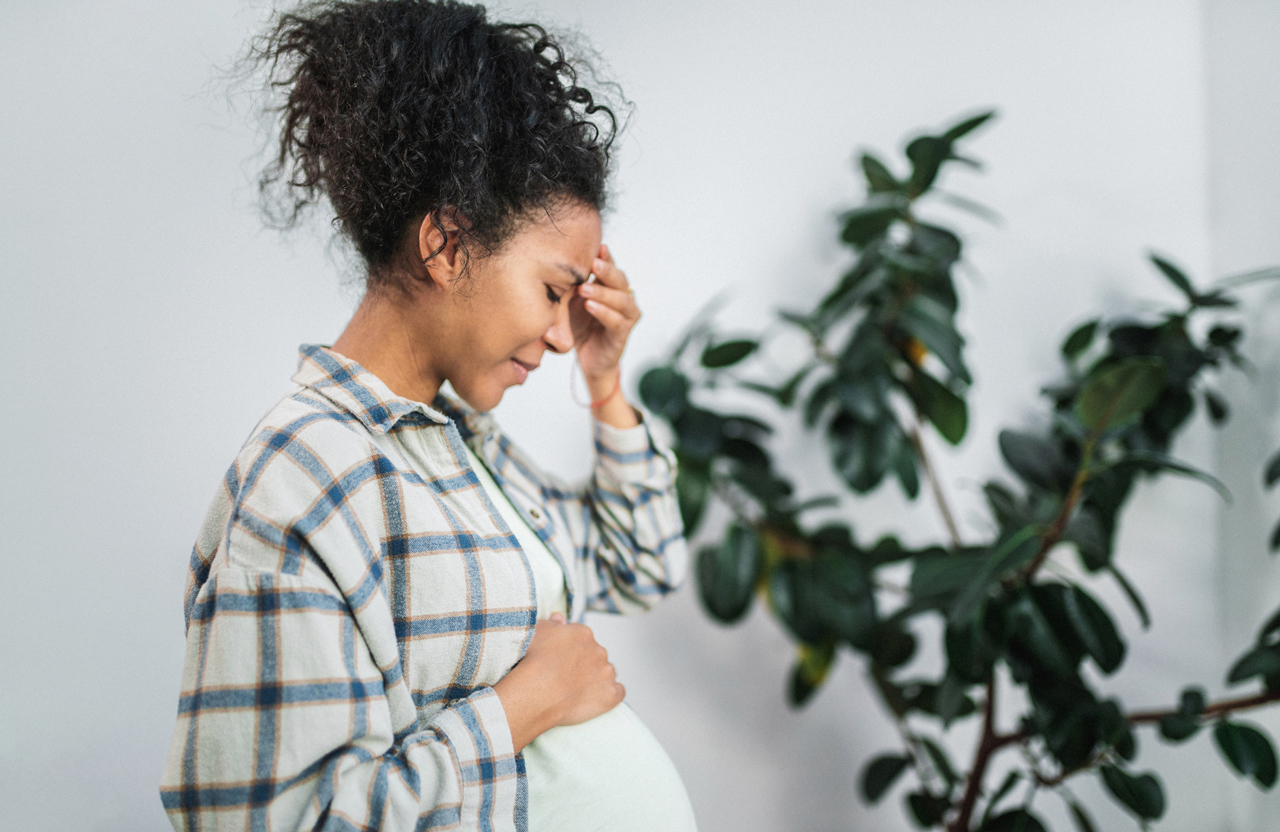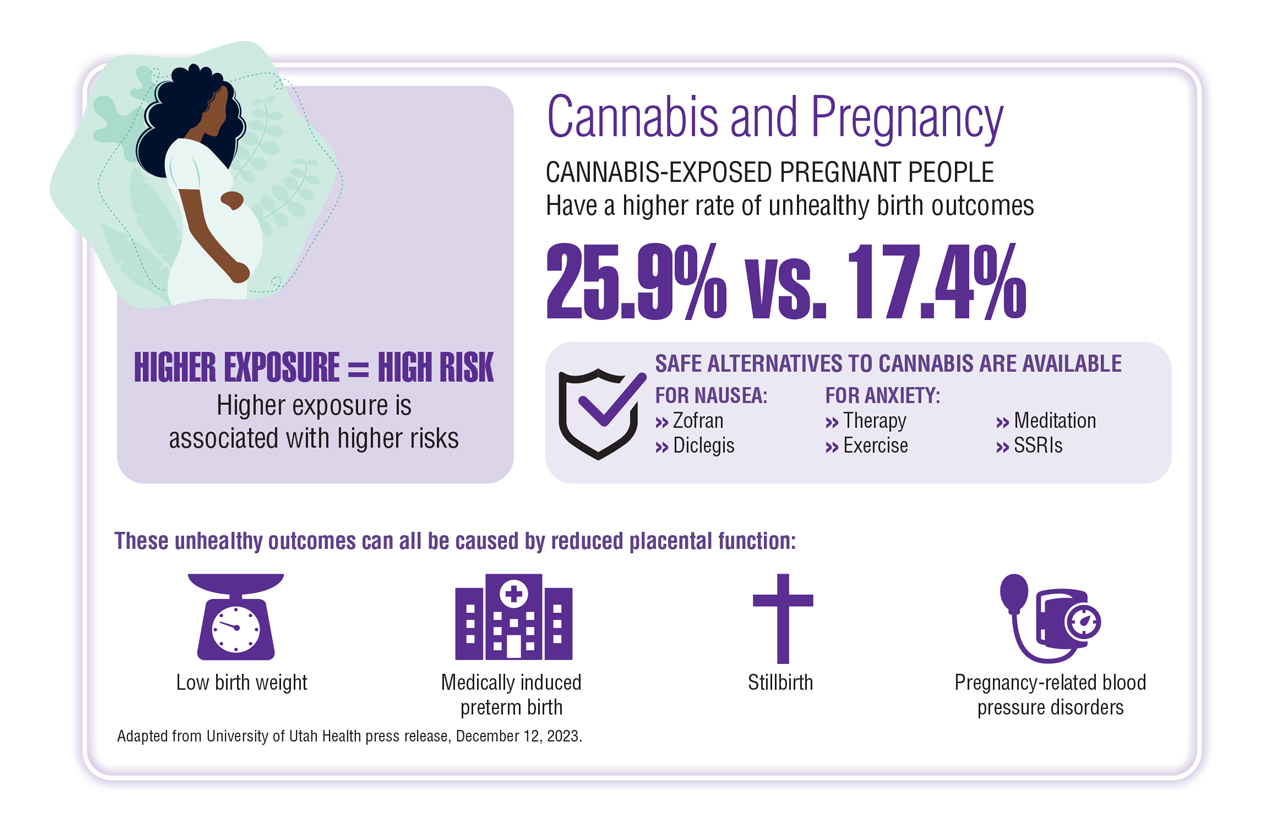Loren Bonner

Tori Metz, MD, frequently gets questions from her patients about using cannabis during pregnancy. For Metz and other clinicians, this has been a hard question to answer.
But findings from a study published December 12, 2023, in JAMA led by Metz and fellow researchers at the University of Utah Health, can hopefully inform clinicians as they talk to patients about the risks of cannabis use.
Metz and her research team conducted a study of more than 9,000 pregnant patients from eight medical centers across the United States and found that for the individuals who had cannabis metabolite in urine samples, there was a higher risk of adverse outcomes, especially low birth weight for the baby, compared to non-exposure.
“I think that these findings really just reiterate that we need to continue advising pregnant people to abstain from cannabis use during pregnancy,” said Metz, vice chair of research of obstetrics and gynecology at University of Utah Health, during a press conference.
For all the adverse outcomes the researchers examined that were related to placental function, they found that cannabis exposure was associated with a 1.3-fold increase in risk after the impacts of other factors were removed. Higher levels of cannabis exposure over the course of pregnancy were associated with higher risks.
“Higher frequency of use, higher concentrations of use, were associated with more adverse outcomes,” said Metz. “I think we can even tell patients that stopping at any point is helpful.”
The greater risk seen at higher levels of exposure is concerning. Today, cannabis products contain more THC and are stronger than the products that were available when the study data was collected over 10 years ago.
The health impacts of these more concentrated products remain largely unknown.

Strong data and design
Medical cannabis use in Americans has more than doubled over the past decade as legalization of cannabis has become more common. For self-reported maternal cannabis use, results from a 2019 study published in JAMA found that it doubled as well. Data came from women who participated in a survey from 2002 to 2017.
Metz said she believes their study is unique because they didn’t rely on self-reporting. They were able to take a large cohort of women and actually look at cannabis metabolites in urine samples across the course of the pregnancy and examine those outcomes.
Using medical record data, the adverse outcomes—or composite outcomes—related to placental function included small-for-gestational-age birth, medically indicated preterm birth, stillbirth, or hypertensive disorders of pregnancy.
Specifically, they found that 26% of people who used cannabis during pregnancy had one of those adverse outcomes compared to 17% who did not use cannabis. When they analyzed for “no exposure,” “exposure only during the first trimester,” or “ongoing exposure,” they found that only using cannabis during the first trimester was not associated with the primary composite outcome. However, ongoing cannabis use was associated with the primary composite outcome.
Advice for clinicians
Natalie DiPietro Mager, PharmD, PhD, MPH, said it is important to talk to all patients about the risks of cannabis exposure on pregnancy outcomes, especially as cannabis use increases with more states legalizing it for both recreational and medicinal use.
Patients often use cannabis to relieve nausea or anxiety during pregnancy.
“I think pharmacists can play a key role in education and counseling for pregnant patients or patients considering pregnancy. Per the American College of Obstetricians and Gynecologists, use of marijuana for nausea and vomiting or other medicinal purposes during pregnancy is not recommended,” said DiPietro Mager, who is a professor of pharmacy practice at Raabe College of Pharmacy at Ohio Northern University. “Rather, patients should be advised to use therapies with better pregnancy-specific safety and efficacy data.”
“Clinicians need to have open conversations because there are safe alternatives we can use to treat those conditions during pregnancy,” said Metz.
Both clinicians and patients need to know how important it is to talk about this, said Metz. “Be open about it and be willing to talk to patients about the risks. Understanding that we don’t know everything, but this study adds to literature and gives us information about cannabis use in pregnancy.” ■